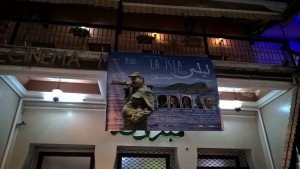On my trip preparing for our research project’s first symposium in December and scouting for venues, caterers and hotels, I went to see La Isla de Perejil by “l’enfant terrible du cinéma marocain”, Ahmed Boulane. Florence Martin writes about it in her first blog entry, from 4 February 2016. The film and its director are part of the transnational injection into Moroccan cinema, as Ahmed Boulane himself comes from the former pirates’ republic of Salé, took on the Irish nationality, and made a film dealing with the absurd situation that caused an international incident between Spain and Morocco in 2002. Co-produced with Boulane-O’Bryne Production (Casablanca) and Maestranza Film (Sevilla), Boulane co-wrote it with Spaniard Carlos Dominguez. Boulane is best known for his second feature film, The Angels of Satan (2007), about a scandal that shook Moroccan sensibilities in 2003: the case of a group of young Moroccan heavy-metal rockers wrongly accused of being Satanists. The film became a real Moroccan box office hit in 2007.

One of the best discoveries watching La Isla de Perejil was the main actor: Abdellah Ferkous, with his quietly, tongue-in-cheek, playful style of comedy. His rotund looks, typical moustache and big cheeks give shape to the comic identity of this TV actor and his character in La Isla, Ibrahim, a soldier of the Auxiliary Forces. At the start of the film one gets a sense of his modest background, his simple life and his contentment with his small (and poor) family, living with their chickens. He likes simple pleasures such as coffee and food, and his satisfaction with life comes through in little rituals, visible for example in the manner in which he wakes up his children and the repeated stretching and washing of his hands and face.
Just before his retirement, Ibrahim is sent to the tiny Isla de Perejil on the northern coast of Morocco, whose sovereignty is disputed by Morocco and Spain. His mission is to monitor the passage of smugglers, illegal migrants and drug traffickers. His rituals continue on this island, although his radio contact with the mainland breaks up and he is alone apart from the company of a cockerel and a goat. One day, while bathing, Ibrahim discovers that the sea has washed ashore an illegal migrant from Senegal. Close to death, Mamadou is carried to Ibrahim’s makeshift home. At first he is treated with suspicion but Ibrahim slowly nurses him back to health, and the two characters bond over food, music and the radio Mamadou has brought along in a plastic bag. As they try to establish their means of survival, they become friends and Ibrahim protects Mamadou, his cockerel and his goat. When Mamadou suggests they eat the animals, Ibrahim is taken aback and assures the Senegalese man that he does not eat his friends. With the growing solidarity between the two men, the international incident that is brewing in the background, and of which they are completely ignorant, becomes ever more absurd: not only is the island tiny, the loneliness there brings two strangers and potential enemies together, while Spanish and Moroccan politicians direct a diplomatic conflict and a military attack on one another.
Watch the film’s trailer here.
Loosely based on an actual conflict between Spain and Morocco in 2002, this is a gentle farce that reverberates with political undertones. Not only does it look in some detail at the refugee crisis and the possibility of solidarity between Africans in their ‘fight’ against the European coloniser, it also makes fun of this coloniser in his inability to deal with Moroccan sovereignty. The film has a satirical bite to its treatment of the relationship between the Spanish and the Moroccans, but the postcolonial critique does not spare the ineptitude of Moroccan politicians either. The concept of nationhood, this film tells us, is hollow: the island is abandoned, but the moment someone sets foot on it and raises a faded, washed-out Moroccan flag (orange and yellow instead of bright red and green), the neo-colonialist tendencies of territorialism come flooding back. The absolute absurdity of this conflict is highlighted by the filmmaker, as he emphasizes the smallness of the island, and uses a comical actor as the single, middle aged soldier rather than the historical team of six Moroccan soldiers ‘invading’ the island with a dinghy.
Stefanie Van de Peer